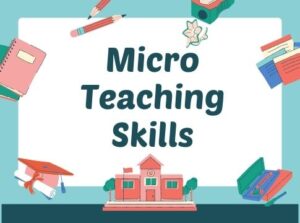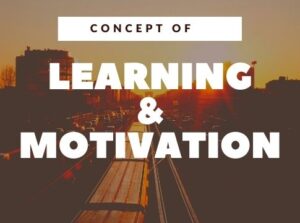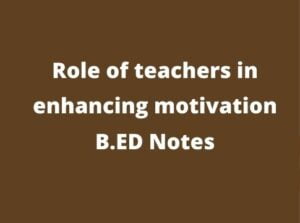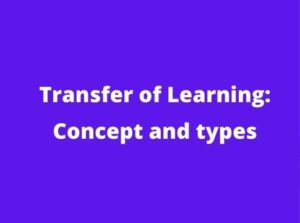Factors influencing learning: Learning is a comprehensive process. This process is influenced by a variety of factors related to the learner, the teacher, the process and the content. Thorough knowledge of these factors will prove very helpful for the teachers and parents in understanding and guiding their children’s learning.
There are mainly three factors that influence learning these are-
- Personal factors
- Environmental factors
- Teacher related factors and
- Content Related factors
- Process related factors
Factors influencing learning-B.Ed
Personal Factors
Learner related factors:
The learner is the key figure in any learning task. How he will learn or what he will achieve through a particular learning act depends upon his own characteristics and the way of learning, Such things associated with him can be described as follows-
- Learner physical and mental health: Learning is greatly affected by the learner physical and mental health maintained by him particularly at the time of learning. A healthy child learns better, similarly, a tense emotionally and mentally disturbed child does not show much progress in learning.
- The basic potential of the learner: The results achieved by the learners through a process of learning depends upon his basic potential like-
- Learner innate abilities and capacity of learning a things
- Learner basic potential in terms of general intelligence and specific knowledge, understanding and skills related to the particular learning areas.
- Learner basic interest, aptitude and attitudes related to a learning particular area.
- Level of aspiration and achievement motivation: Level of aspiration refers to the personal goal of an individual which he expects to achieve. Keeping in view his abilities, one has to maintain the level of his aspiration and achievement to a reasonable level.
- The goal of life: Learning depends on the goal. Goals and philosophy of one’s life determine his way of looking towards the things, his inclination towards the learning in a particular area, patience maintained for continuing his learning despite the heavy goals.
- Readiness and willpower: no one can make a learner if he or she is not ready to learn. On the contrary, if the learner has the will to learn a thing the automatically he will find the way to its effective learning.
Environmental Factors
1. Teacher related factors
The teacher is the most prominent factor in the teaching-learning process and is responsible for the children’s learning activities
- Knowledge of the subject: Proper knowledge of the subject is very important. Teachers knowledge, experience and abilities greatly influence learner learning
- Teacher behaviour: A teacher behaviour is greatly influencing the learning of the students directly. A teacher should inherit all the essential qualities of a good teacher are sympathy, cooperation behaviour, objectivity, sweet temper, polite etc are all such traits that should always reflect in the teacher’s behaviour.
- Personality: Good and appealing personality is the basis of successful and effective teaching. He must create an impression on his students by keeping an appropriate balance between his deeds and action.
- Class management and control: Optimum learning is not possible without proper class management and control. So, a teacher should know the art of managing and controlling the class.
2. Content related factors
The following are the content-related factors:-
- Effect of previous experience: New learning depends upon old learning. Learning is always influenced by previous experiences. Previous learning in the field makes the task familiar and therefore, more approachable.
- Meaningfulness of material: The result of experimental studies have clearly indicated that meaningful material can be easily memorized as compared to meaningless material. Meaningful means that the material conveys some sense and has some associations and previous experience with the learner.
- Difficult of material: This is another important factor in learning when there are more than 20% difficult words in a lesson the task of reading becomes very difficult for the reader.
- Multi-Sensory Approach: Number of illustrations, figures, pictures, tables projecting the abstract unfamiliar and significant aspects of the lesson facilitates learning.
- Nature of content: The nature of content is a very important factor that influences learning. The nature of the content should be simple to complex
- Selection of contents: The contents should be selected according to children need, interests and abilities that influence greatly the children learning.
- Organization of contents: The contents should be organized in such a way that they can easily accessible and enjoyable for children learning and it should be according to children age and class.
3. Process related factors
The methodology adopted for teaching-learning experiences
- Linking new learning with the previous learning
- Co-relating the learning with subjects such as Social science-history, geography, civics. Biology-Botany, Zoology, Microbiology
- Utilization of maximum number of sense
- Provision of drill work. Eg. Revision and practice
- Provision of proper reinforcement and feedback. Ex- Smiling, excellent, answer is correct.
- Selection of suitable teaching-learning method. Ex- Discussion method, heuristic method, laboratory method etc.
Teaching-Learning environment and resource
Socio-emotional climate available in the institution in the shape of teaching-learning relationship, pupil-pupil relationship, staff-staff relationship
The availability of appropriate learning materials and facilities in terms of teaching-learning aids, textbooks, library and laboratory facilities etc
The proper conducive environment and learning situation-
- Proper seating arrangement
- Calm and peaceful environment
- Management and control of the factors leading to distraction
- Co-operative and competitive
- The congenial environment at home
- Provision of proper change reset and recreation
- Provision of opportunity for creativity and self–impression.



